This article is the first in a two-part series reporting on the proceedings of the 15th Young Investigators’ Meeting, which was held in Ahmedabad and Gandhinagar, Gujarat, from 13 to 17 February, 2023. The meeting was attended by nearly eighty young researchers and post-doctoral fellows, in addition to several mentors, science professionals, funding agencies (national and international) and institutional representatives for five days of talks, panel discussions, breakout sessions and poster presentations.
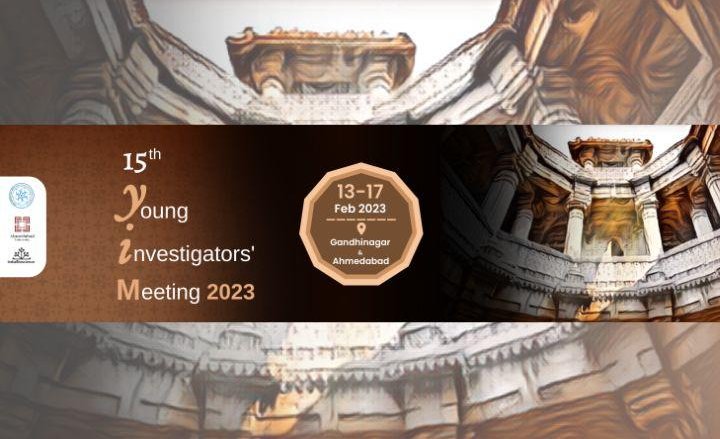
Since 2009, the Young Investigators’ Meetings (YIMs) have been providing a common platform for young researchers, senior scientists, and institutional representatives to discuss issues pertinent to conducting scientific research in India. Despite the unprecedented circumstances of the past two years, which resulted in the hosting of virtual YIMs in 2021 and 2022, the 15th YIM provided an opportunity for wider discussions, networking, and in-depth conversations on various factors that affect scientific productivity in India.
The 15th Young Investigators’ Meeting (YIM) was held in Ahmedabad and Gandhinagar, Gujarat, from 13 to 17 February, 2023. The meeting was attended by 44 young investigators selected from all parts of India, as well as 46 postdoctoral fellows, approximately half of them were from institutions in India. The meeting also brought together 8 senior scientists in the form of mentors, several guest speakers and panellists, and the directors of 23 research institutes and universities. And for the first time ever, YIM 2023 was held on the institutional campus imparting a distinctive essence to this gathering.
This year, the organisers of the meeting were Dhiraj Bhatia (IIT Gandhinagar), Nishad Matange (IISER Pune), Ratna Ghosal (Ahmedabad University), and Shantala Hari Dass (IndiaBioscience).
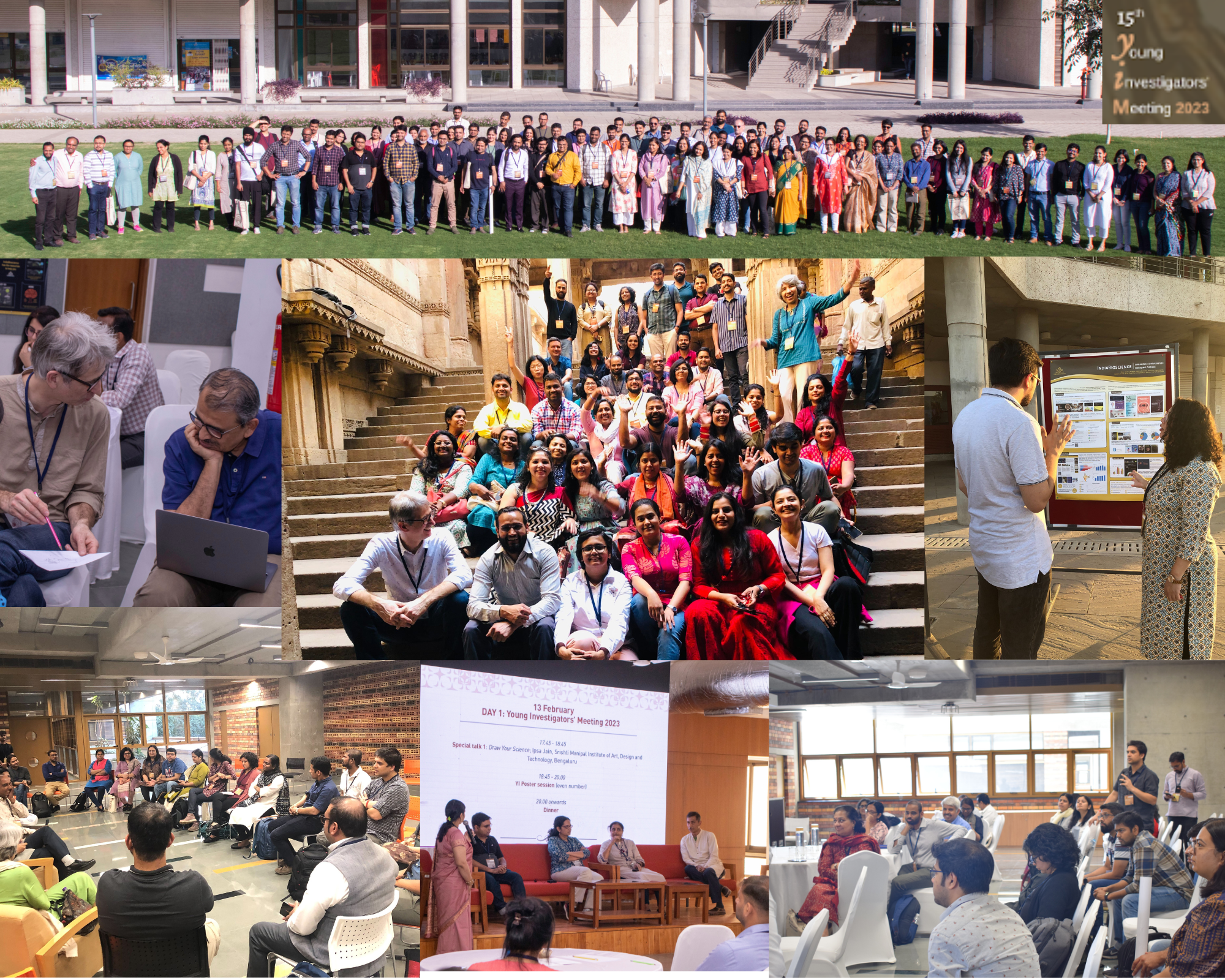
Inaugural Sessions and Keynote Lectures
The meeting began with a welcome note by Satyajit Mayor, NCBS-TIFR, Bengaluru, who outlined the overall structure of the meeting — the first three days would include keynote lectures, mentor talks, panel discussions, breakout sessions, poster sessions, and special talks, while the final two days would consist of the PDF Satellite meeting, wherein Post-doctoral fellows get a chance to directly pitch their science to institutional representatives.
Mayor described YIM’s roots in the sabbatical of Ron Vale, HHMI, Janelia Research Campus, the communication gaps in the Indian researcher community and the birth of IndiaBioscience. He urged young researchers to voice their concerns openly in the scientific field to foster the development of a sustainable research community.
The first keynote lecture of the meeting was delivered through a video call by Rajesh Gokhale, Department of Biotechnology (DBT), Government of India, who could not be physically present at the meeting. He emphasised the importance of utilising a combination of technology, large datasets, artificial intelligence, and communication in modern research. He addressed researchers to collaborate and find overlapping areas in different disciplines, in order to examine scientific aspects from multiple perspectives.
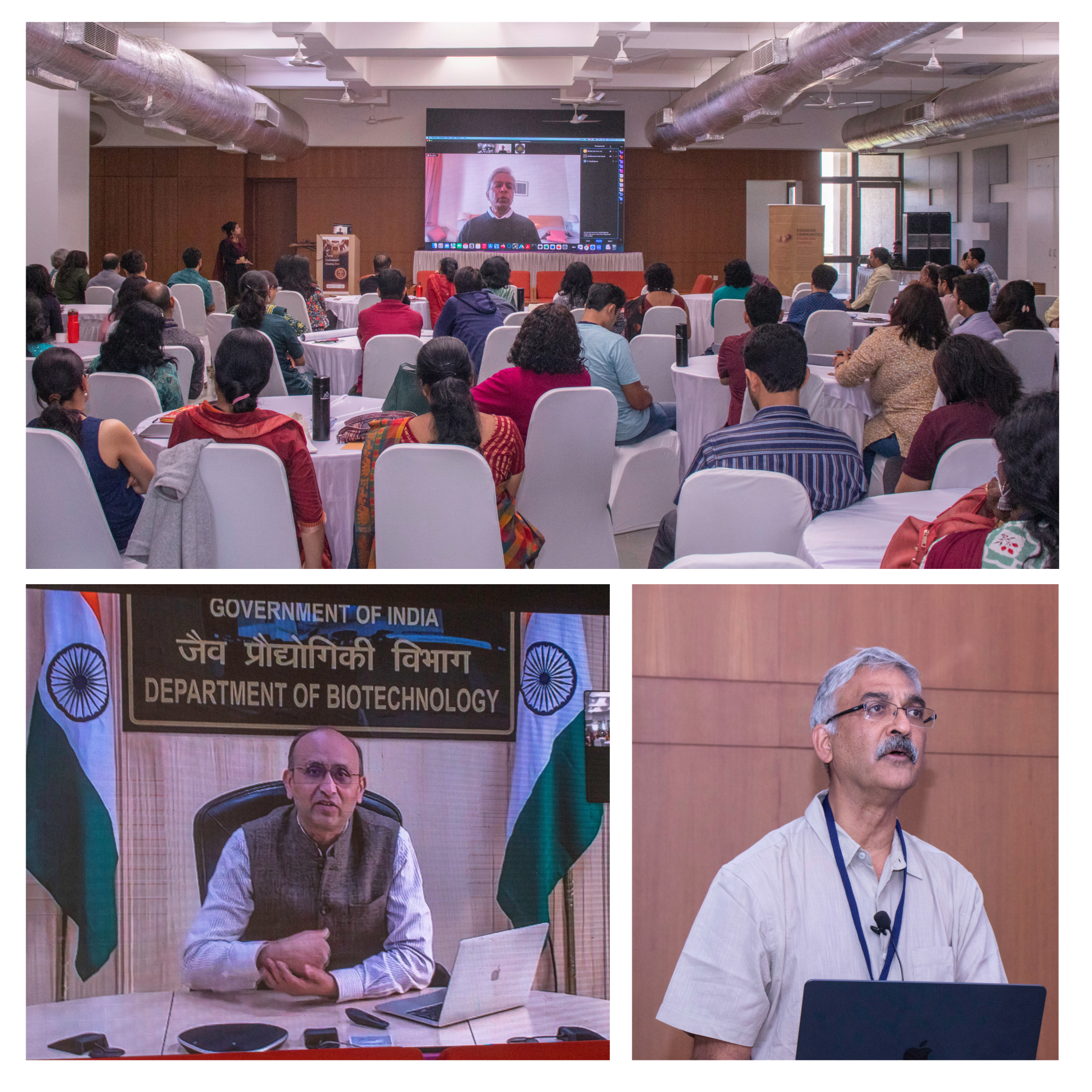
The second keynote address was also delivered through a video call by K VijayRaghavan, NCBS-TIFR, Bengaluru. He highlighted the responsibility of scientists in addressing global challenges, such as climate change and waste management. He emphasised the need for institutes to focus on national problems and facilitate collaboration among students and researchers from different institutions. And concluding the address with a call to action, he encouraged individuals to bring about the change they want to see in the world.
The planet is at cusp, scientists can help steer us to a sane future.
Special Talks
Ipsa Jain, Srishti Manipal Institute of Art, Design and Technology, Bengaluru, delivered a special talk titled, ‘Drawing (your) Science’. Outlining the importance of drawing in preparation of discovery, observation, ideation, hypothesising and theorising, she highlighted her lab notebook sketches of collaborative work done with various scientists-artists. ‘Wandering pencil allows the mind to wonder’, said Ipsa and encouraged scientists in the audience to explain their science through drawing to the person sitting next to them. To explore the undocumented relationship of scientists with science and their working space, she invited YIM attendees to sketch, doodle, draw and paint on the installed canvas at the venue in response to the given prompts. Take a peek at some of the responses below.
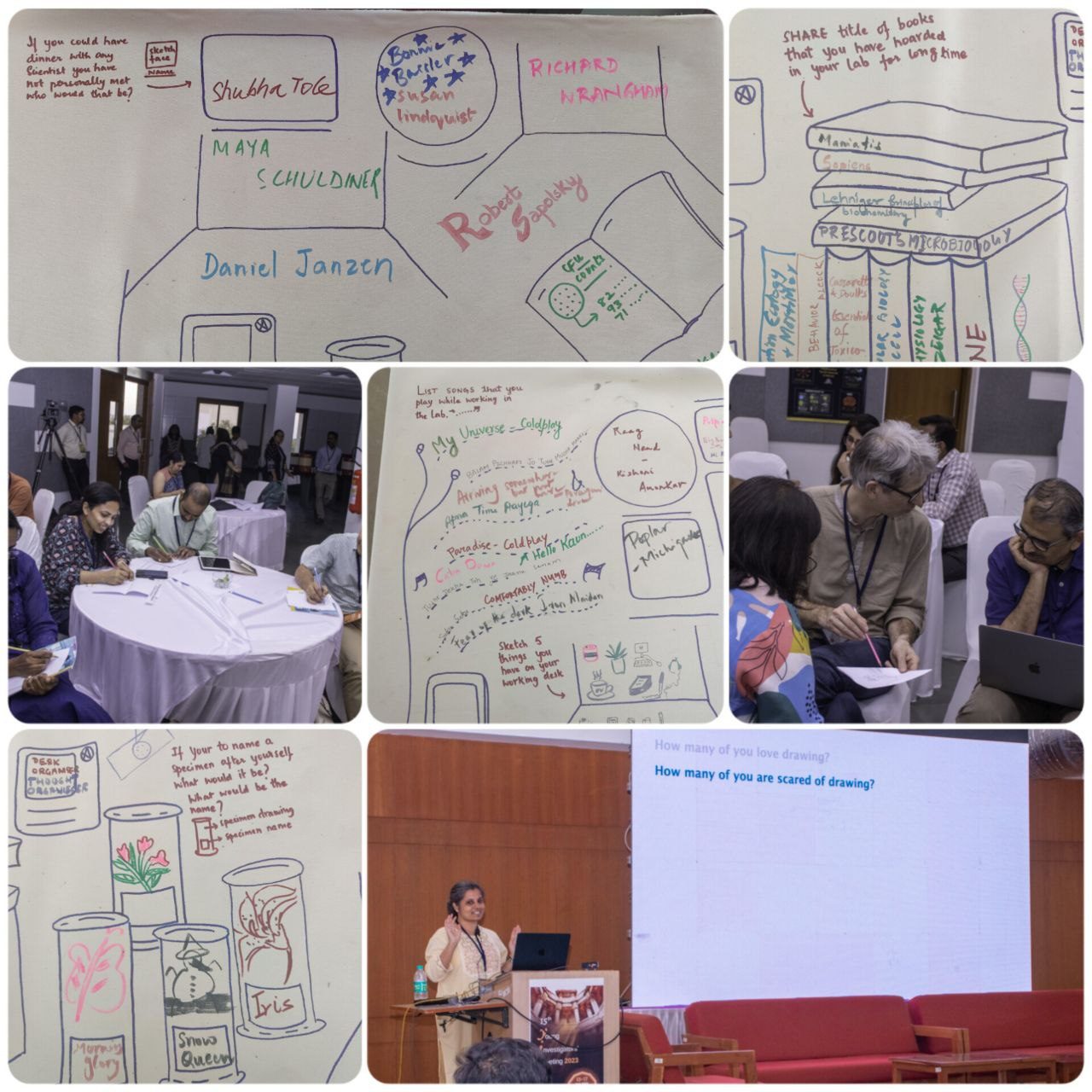
The second special talk by Kapil Maithal, Zydus Lifesciences, Ahmedabad was on ‘Impact of Vaccines- Public Health and Society’. He discussed the role of academia in vaccine development and emphasised the importance of academic research in understanding the biology of host-pathogen interaction, as this knowledge is essential for identifying targets for vaccine development. Additionally, he stressed the importance of academic research in developing effective diagnostic kits and establishing epidemiological surveillance to track disease outbreaks.
Mentor Talks
Eight renowned researchers, including two from foreign countries and six from national research institutes and universities, were invited as mentors for YIM 2023. They shared their experiences and valuable lessons with young investigators from diverse scientific and socio-economic backgrounds. The mentor talks highlighted the importance of collaboration, networking, and perseverance in research.
This year’s mentors were — Anirban Banerjee (IIT Bombay), Anne Spang (University of Basel, Switzerland), Carsten Janke (Institut Curie, Paris, France), Thomas Pucadyil (IISER Pune), Krishnaveni Mishra (University of Hyderabad), Tamal Das (TIFR-Hyderabad), Hema Somanathan (IISER Thiruvananthapuram), Sharmistha Majumdar (IIT Gandhinagar). The mentors we selected bring forth a diverse set of opinions, with affiliations spanning across various research institutions both nationally and internationally, as well as institutions emphasising research and education (IISERs, IITs, and central universities).
Some key insights emerging from these talks are mentioned below:
Interdisciplinary research and collaboration is the way forward
Interdisciplinary research and collaboration is crucial for advancing scientific knowledge and exploring complex scientific questions. Das emphasised the integrative approach his lab uses to study collective cell dynamics using mechanobiology, which sits at the intersection of physics and biology. Similarly, Pucadyil highlighted the importance of collaboration with complementary skills. He suggested that effective collaborations can only be established if researchers have a clear intention and understanding of each other’s strengths and weaknesses.
Majumdar discussed how cross-disciplinary collaborations and complementary skill sets can tackle complex problems and make exciting discoveries. Giving an example from her own lab, she described how her lab-members overcame infrastructure limitations by making new collaborations with computer scientists, which also advanced their research significantly.
Embrace your scientific journey
“Every journey is unique”, said Somanathan while sharing her own experiences. She spoke about taking a break after her PhD to give care to her daughter. Despite a four-year hiatus, she remained committed to pursuing an academic career and secured a postdoctoral position working on honeybees. She subsequently obtained a faculty position and faced a series of struggles as she adjusted to academic life and tried to balance work and family responsibilities.
Every journey is unique.
Janke shared his experience of shifting from microtubules to yeast and pursuing a third postdoc, despite facing criticism for not becoming a group leader. He encouraged young researchers to take risks and pursue research that excites them, emphasising that passion and curiosity are essential qualities for a successful career in science.
It is important to pursue a career one is passionate about, rather than focusing on competition or external pressures. Spang talked about her career transition from being a chemical engineer to moving to France to study biochemistry and realising she wanted to do research. She advises those in science to be bold, ask bold questions, and love the science they do.
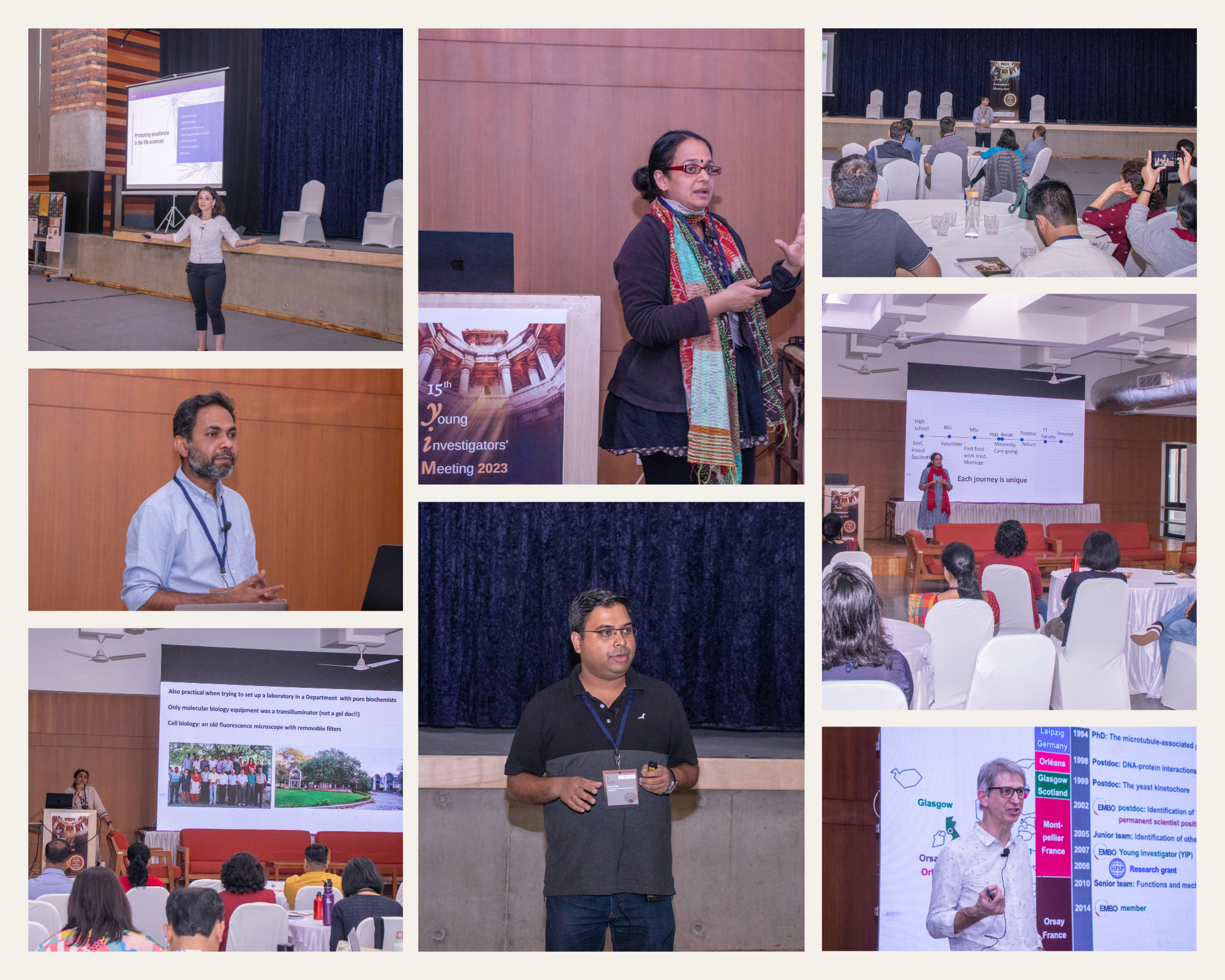
Overcoming hurdles and failures
Somanathan discussed the various obstacles she encountered, including multitasking in both field and lab roles, ensuring student safety and welfare in remote areas, aligning ecological and institutional timescales, and facing delays in the funding process, which subsequently affected both her lab work and fieldwork.
Mishra shared her story of setting up a lab as a young cell biologist in a department dominated by biochemists. Despite facing challenges, such as a lack of infrastructure and equipment, she emphasised the importance of making one’s own space in research and exploring new avenues, rather than feeling constrained by their department’s focus or available resources.
Spang also pointed out the importance of focusing on having a life outside of research as it can ultimately increase productivity. Answering a question from the audience about how to navigate work-life balance, she said “Figuring out what to let go is the answer”.
Figuring out what to let go is the answer.
Building your dream (lab) team
Building the right team is crucial when it comes to nurturing the next generation of scientists, as the success of the lab depends heavily on them. Banerjee emphasised on creating an environment where everyone feels valued, encouraged to share their ideas, and empowered to take ownership of their projects.
Mishra and Majumdar both emphasised on investing in the professional and personal growth of the team members, as a mentor can not only foster a strong sense of community but also help to cultivate the next generation of successful scientists.
Communicating science beyond lab bench
As scientists, it’s crucial to communicate research outside the confines of the lab and engage with the public using creative techniques to make complex scientific concepts more accessible. “Reach out to the public by telling a story”, said Janke and shared his own experiences of using drawing to connect complex scientific concepts. He even distributed copies of ‘Globule,’ a graphic book that showcases the history of dendritic cells and their role in immune mechanisms and vaccination processes.
Reach out to the public by telling a story.
Somanathan emphasised the significance of effective communication in improving public understanding and support for scientific research.